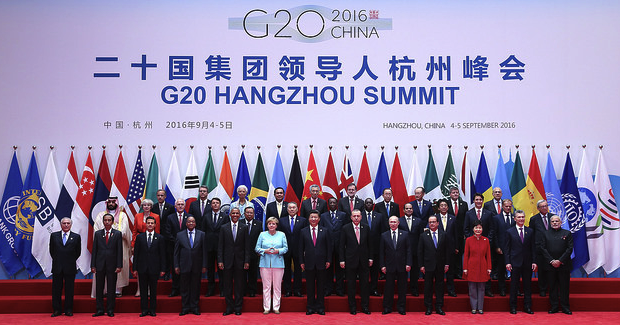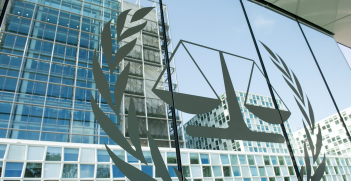Assessing the G20: Great Impetus Amid Frictions

Given rising economic, social, political, environmental and security risks around the world, this week was a tough time to hold a consensus-oriented global summit of major powers. Did the G20 Hangzhou summit manage to break new ground and significantly advance global governance?
The Chinese presidency of the G20 deployed unprecedented resources to advance a common-good agenda focused on growth, innovation, trade and investment liberalisation, development, climate awareness and inclusion. Yet, only mid-level outcomes could be attained; confidence-enhancing breakthroughs remained out of reach in the current international context. The final communiqué mostly endorses countless proposals from lower level working groups but does not indicate a real sense of ownership by leaders of the most powerful countries. The diplomatic ballet of bilateral and multilateral summit was helpful but could not overturn current trends of fragmentation and entropy, driven by internal social forces.
Great risks and tensions currently beset our global system; it is hard to find any state leader with any political space to think long term. In this charged context, the Chinese presidency and Chinese economic ministries and think tanks unleashed tremendous entrepreneurial energy throughout the year leading up to the Hangzhou summit. They activated or enlivened working groups on global financial governance, trade, environment and development. They organised more meetings and more elite consultations than any G20 before. Chinese leaders genuinely attempted to make this G20 one of the most important G20 summits since London in 2009, with a focus on long-term governance and sustaining globalisation in the age of green and shared growth. They even managed to absorb and attenuate the great uncertainties hovering around the Chinese economy from the summer of 2015 until early 2016. No country poured as much effort and focus on a successful G20 since South Korea in 2010. The city of Hangzhou was given a facelift, turning it into the cleanest and most beautiful city in China, at the cost of emptying it of many of its inhabitants just before the summit.
Did it work?
Achievements of Hangzhou
Building on a series of key meetings, including the 24 July Chengdu meeting of finance ministers and the 10 July Shanghai meeting of trade ministers, the Chinese G20 managed to plug a few holes in the global liberal system and to advance a few mid-level priorities. For the first time, the G20 also embraced climate (and the Paris Agreement) and the UN Agenda 2030 (Sustainability Development Goals), helping global governance to improve its overall coherence, by improving the interface between the UN-based regimes and the Bretton Woods economic structure. China also played a positive role in connecting developed, emerging and developing countries in its initiatives this year. Specifically, I would argue that the Chinese G20 process has scored successes in the following dimensions:
- The Chinese G20 saw significant concentrated thinking and policy planning on new long-term sources of growth, particularly innovation (with a new Blueprint on Innovative Growth), structural reforms (with preparation of common indicators), and focused investment in infrastructure.
- Infrastructure investment is identified as a key link between growth, development (Agenda 2030) and a greener future. In this regard, the Multilateral Development Banks’ Joint Declaration of Aspirations on Actions to Support Infrastructure Investment breaks new ground. It brings together old development banks (World Bank, Asian Development Bank, etc.) and new banks (Asian Infrastructure Investment Bank, New Development Bank) around a coordinated effort to increase efforts for infrastructure.
- The G20 brought new impetus to the Paris Agreement on climate change (COP 21), thanks to the surprise ratification by both the US and China just before the G20. The final communique devotes one paragraph to climate (43), with some new thinking on green financing.
- G20 leaders agreed to a coordinated discussion around over-capacity in steel, committing to a dedicated meeting in September. They may have defused a very hot trade crisis.
- Significant new ground was broken on international monetary governance with China’s yuan joining the IMF’s Special Drawing Rights (SDR) basket of currencies on 1 October (at the level of 10 per cent) and support by G20 members for some issuance of SDR-denominated bonds. Meanwhile, China indicated its support for the Paris Club as the key venue for debt negotiations.
- Concrete targets and deadlines are set regarding tax havens. The 2017 German G20 is due to list non-cooperation jurisdictions and prepare sanctions.
Shortcomings in Hangzhou
A few critical files saw positive language but few concrete outcomes.
- On trade and investment, the Chinese presidency deployed great efforts to break deadlocks and issue a new code of conduct on investments. For all such efforts, however, the agreement remains vague and aspirational in both files. The files were just too political sensitive for the US and other countries to agree, especially while China is still perceived to gain unfair advantages from the open global system.
- Fossil fuel subsidies also remained too hot to allow for real concrete breakthroughs.
- IMF and World Bank quota reforms are on the agenda but carried forward to the Germany presidency.
- Inequality and inclusiveness are addressed directly by the G20 communique but concrete measures are lacking, since they are mostly domestic.
Most significantly, while the economic elites of G20 countries and international organisations put up a good show, real political coordination requires trust among great powers. Today, security tensions around the South China Sea, Korea, Syria, and Ukraine have deeply eroded trust among great players. Technical coordination at the Hangzhou G20 has not generated enough momentum to overcome non-economic tensions among great countries.
China and global governance leadership
What have we learnt about China’s leadership capacity in global governance? Overall, China showed great commitment to the global liberal order and dedicated great public policy resources toward systematically addressing a few weak links of that global liberal order. Few countries, if any, have taken the G20 process so seriously or framed the G20 in the light of long-term global governance as China did. China has led significant progress in development, growth, infrastructure financing, innovation and green shift. China has created new links among nations and among domains.
At the same time, Chinese global leadership has been hampered both by some internal contradictions (a partially controlled economic structure) and by its uncompromising attitude in its close neighbourhood.
Despite such contradictions, China has established itself has a critical player in global governance.
Dr Yves Tiberghien is the Director of the Institute of Asian Research at the University of British Columbia (UBC), Executive Director of the UBC China Council, Co-Director of the UBC Master of Public Policy and Global Affairs (MPPGA) and Associate Professor of Political Science.
This article is published under a Creative Commons Licence and may be republished with attribution.





